Sometimes being a creator feels like riding a bike in first gear on flat land. You're pedaling like hell, you're moving forward, but it feels like you're working REALLY hard for a small amount of progress.
The great thing about being a creator is that you receive rapid feedback on your ideas. If you get ANY response to your published work, it usually happens quickly.
But, in the beginning, you may not receive any feedback at all. So when we don't see results, it's easy to think progress isn't happening.
Progress can be so slight that it feels indiscernible if only you look within a short period of time.
I often think of this quote from James Clear:
“Complaining about not achieving success despite working hard is like complaining about an ice cube not melting when you heated it from twenty-five to thirty-one degrees. Your work was not wasted; it is just being stored. All the action happens at thirty-two degrees.”
Much of a creator's life is like this.
Tiny, indiscernible progress compounds...but it still takes a little faith to believe progress is happening when you can't see it.
So how do you keep going it feels like you're not actually going anywhere?
Expand your time horizon
You need to adopt a long-term mindset. Micro trends aren't always indicative of macro trends. Take a look at the historical performance of the S&P 500:
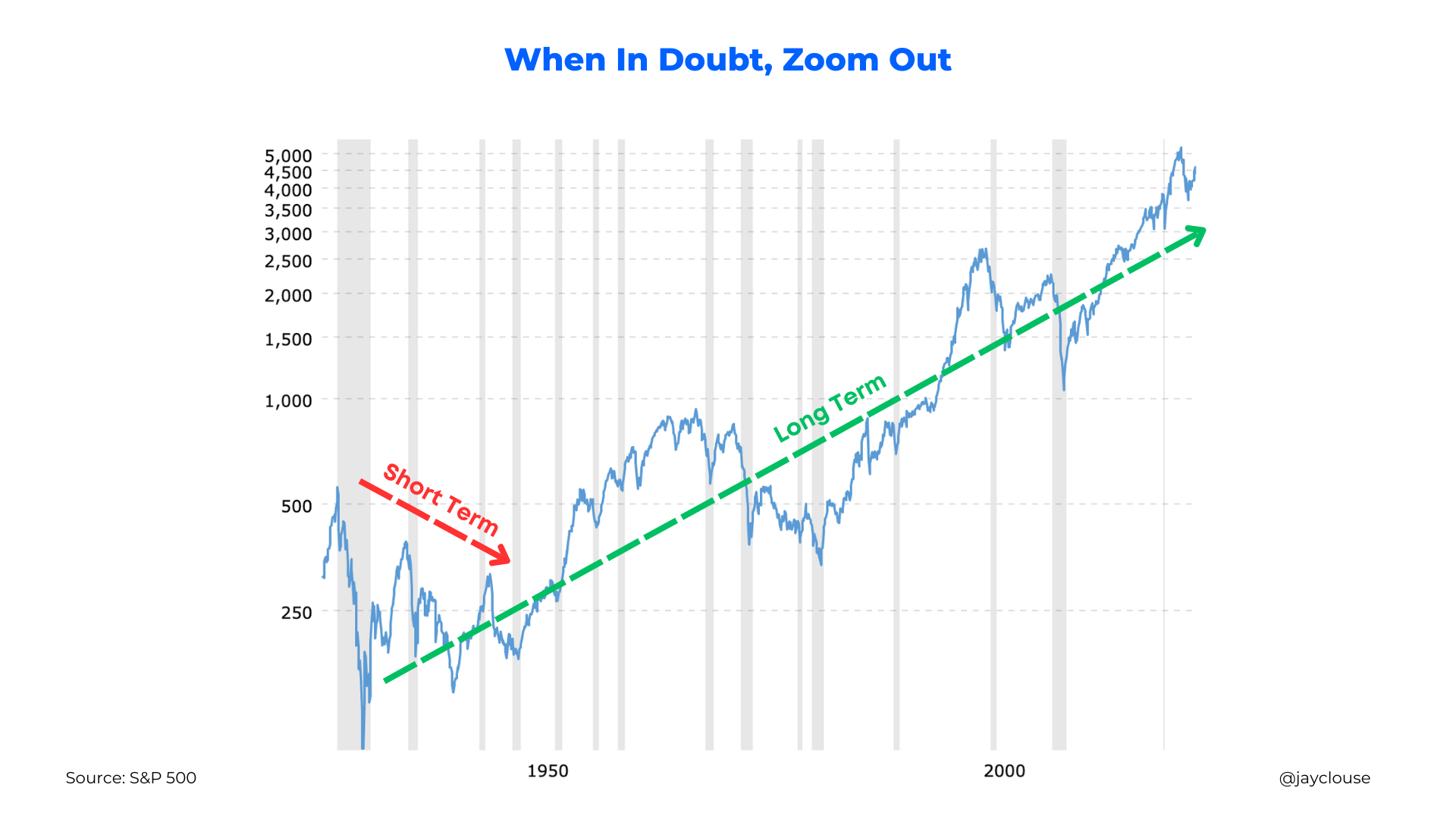
Often, when we get ourselves in a tizzy around our current progress, we're looking at a micro piece of a macro trend.
When you think longer term, your strategy changes. Your approach changes. Your expectations and your patience change.
You recognize that progress comes WITH time.
So time is no longer an enemy, but a friend. You aren't working against the clock, you're working with it.
Befriend the data
Whenever I have a down month of revenue, it feels like the sky is falling. But if I look at the data of the overall trend in my income over the last several years, I see a much different picture:
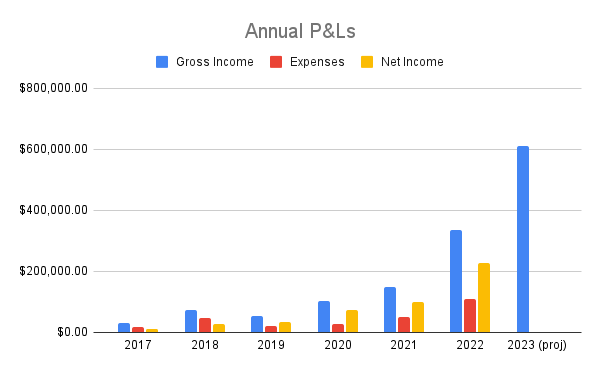
You may also notice that it took me several years to break six figures – and that was mostly service-based revenue! My "creator" income didn't really kick in until 2021.
This is what makes data so powerful. The better you are at capturing and reading data, the better you're able to stave off your panic brain and look at the bigger picture.
I recommend Quickbooks to capture financial data over time and Fathom Analytics to capture website data.
Look for signals of progress
When I spoke with the aforementioned James Clear on my podcast, he talked about one of his struggles writing Atomic Habits:
"For the first three years that I wrote on JamesClear.com, I wrote a new article every Monday and Thursday. And so that feedback cycles pretty quick. You know, you write an article, you send it out, email it out to the list, and then you start getting replies from people. That sort of instant feedback within an hour or so of being published is really nice. I did not realize how much I thrived on that. And really, a lot of the time, I would only need one good comment that said, Hey, you know, this is great. I really enjoyed this, to get me to show up the next time. You know, it doesn't take a whole lot of feedback to feel like, 'Hey, I'm on the right track here, I should keep doing this.'
And when I started writing the book, I used to write for a month, two months, three months, four months, I didn't get any feedback. Nobody said anything. It was just me with a Word document. And I didn't realize until I was maybe 6, 9, 12 months in, I don't know, it was a while, until I was like, man, I just need somebody to tell me that I'm on the right track here. You know, I don't need 1,000 people to read it and tell me it's great. But I need somebody to tell me I'm not like totally missing the mark. And so hiring an outside editor helped a lot for me. Then there's also, so that, that element of feedback, I think we could probably summarize it as signals of progress. You need signals of progress in pretty much any endeavor to feel like you should continue moving forward."
Signals of progress don't need to be huge, slap-you-across-the-face moments.
There are very small signals of progress that you can find early on:
- A feeling of enjoyment
- The belief that you're getting better
- Things getting easier
- Someone taking the time to comment or reply
- Someone sharing your work
- A 1 out of 10 in YouTube Studio
You may not get profiled in Forbes. You may not get an award or massive public recognition.
That doesn't mean you aren't progressing.
I've turned this into a game – I try to recognize (and celebrate) the smallest signals of progress. These signals are the building blocks of large-scale progress. If you're seeing tiny signals of progress, that is still indicative of the macro trend improving.
Design for bingeability
I've learned a lot from our foray into YouTube – and maybe more than anything else, I've learned about the power of making "bingeable" content.
Our channel has grown quite a bit in the last couple of months:
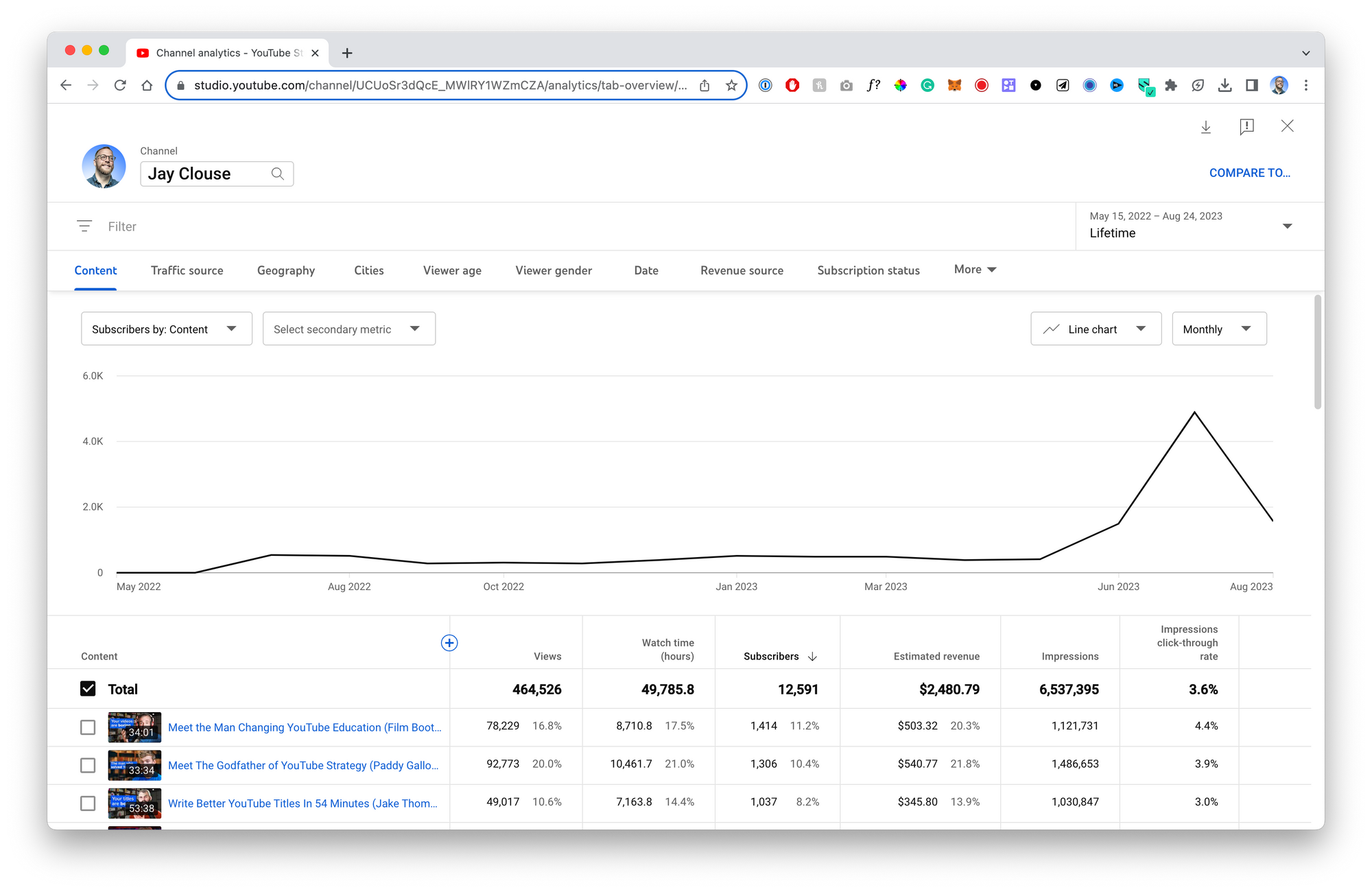
But even before the spike in subscribers you see above, I was getting comments from viewers who were "binge-watching" our channel:
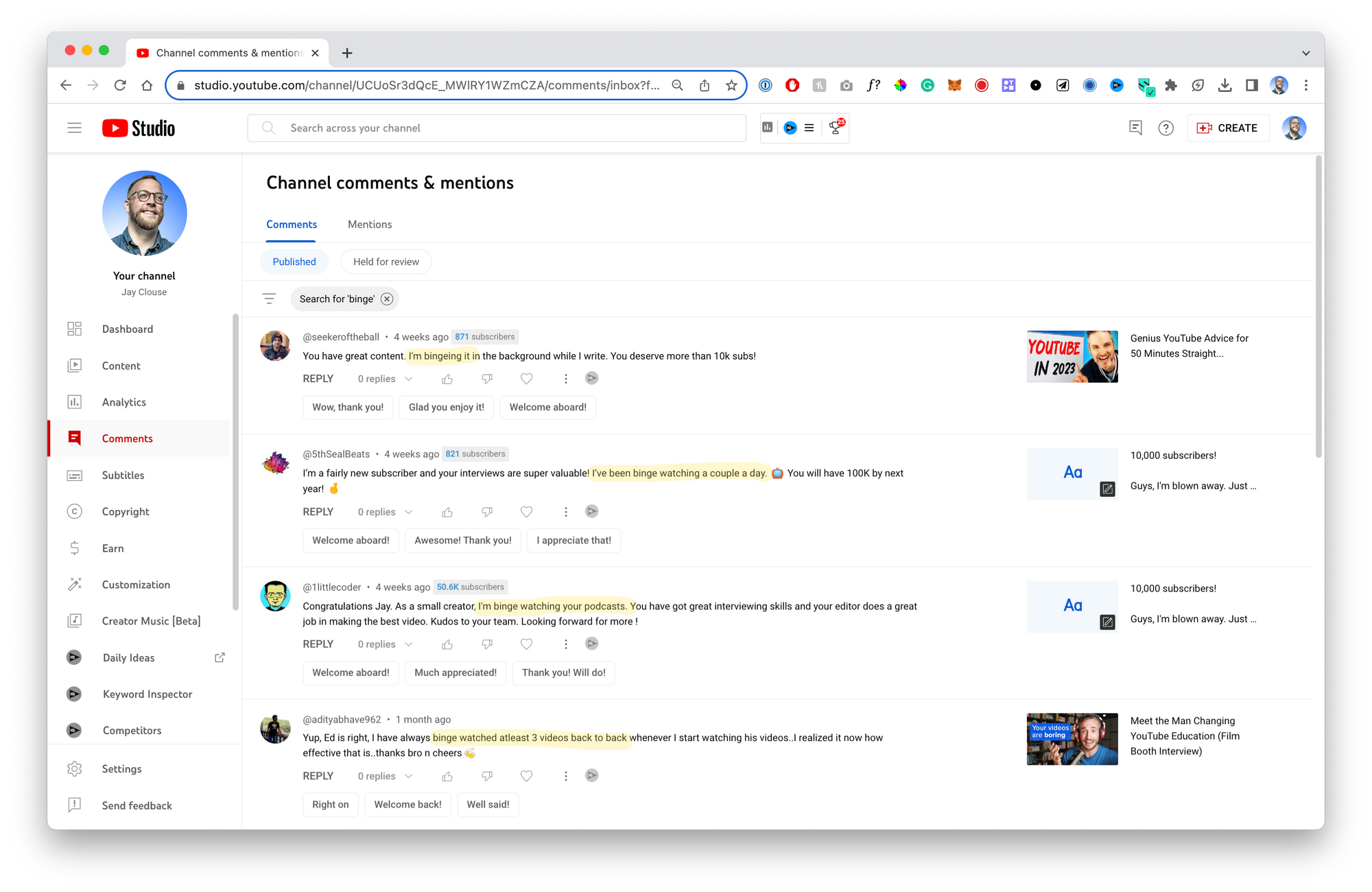
I took those comments as a signal of progress. Even though we weren't yet getting the views or subscribers I thought our channel was capable of, this told me that the content was good – and once people discovered it, they loved it.
All I needed was a little luck.
That "luck" came in the form of our interview with Paddy Galloway getting a LOT more views than typical. Suddenly, a lot of new viewers found our channel.
And, as a result, many of those viewers began bingeing our past videos. Not only did Paddy's video do well, but we saw spikes in new viewers across the library.
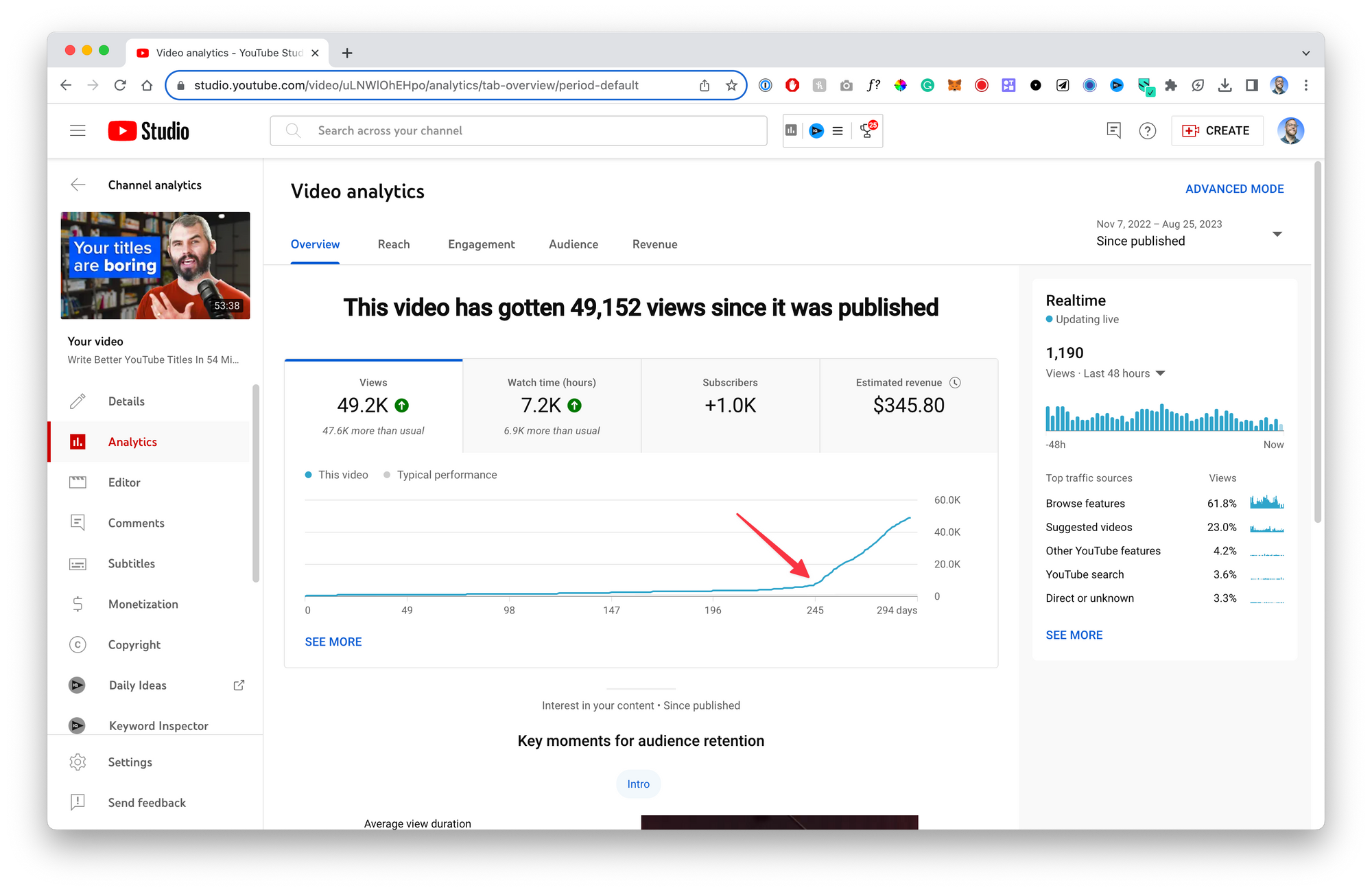
The inflection point you see in the video above is directly correlated to releasing the interview with Paddy Galloway.
If you look at the Views before that moment, growth is so slight that the video felt dead. And it wasn't just our video with Jake – about a dozen of our videos took on new life!
I now see audience feedback using the word "binge" as the ultimate signal of progress.
Conclusion
When it feels like you're not making any progress or getting any feedback, don't let yourself give up. Ask yourself:
- Where can I find small signals of progress?
- Am I thinking too short-term?
- What does the data say?
- Does what I'm publishing build on the work before it (i.e. is it bingeable)?
Most creators don't fail.
They simply give up.
Instead, adopt a mindset of radical persistence.
You may not see the progress from that last thing you tweeted or the email you published...but it's there.
And it all adds up.


Join 54,000+ creators learning from firsthand experiments, expert interviews, and actionable advice every week.